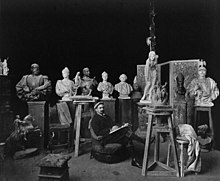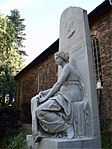Walter Schott
Walter Schott (born September 18, 1861 in Ilsenburg , † September 2, 1938 in Berlin ) was a German sculptor and medalist .
Life
Walter Schott was a son of gräflich stolbergischen huts inspector Eduard Schott . After attending school, he went to Hanover for training and studied at the Berlin Art Academy from 1880 to 1883 . Carl Dopmeyer and Fritz Schaper were among his teachers . From 1885 he worked as a freelance artist in Berlin and created numerous monuments as one of the main representatives of the neo-baroque Berlin sculpture school . In doing so, he became totally dependent on the German Kaiser Wilhelm II and therefore received little attention in the Weimar Republic . He was awarded the title of professor, but did not hold a teaching post.
Walter Schott's urn was buried in his father's grave in Ilsenburg.
Works
Gravestones and sculptures
- Die Kugelspielerin (1897), his best-known work, life-size in bronze in the flower garden at the southern end of Königsallee in Düsseldorf , reduced version in Meissen porcelain
- Figures for the Berlin Cathedral
- Grave for his father in Ilsenburg (1902)
- Tomb for the local politician Carl Deul in the forest cemetery Oberschöneweide (1904)
- Grave for Else von Falckenberg in the Jerusalem Friedhof II at Halleschen Tor in Berlin
- Hunting nymph , bronze , in the Volkspark Humboldthain in Berlin-Gesundbrunnen since 1953
- Nymph fountain at Schlitz Castle
Monuments
Berlin:
- Margrave Albrecht the Bear in the former Siegesallee , Monument Group 1 (1898)
- King Friedrich Wilhelm I at the age of his accession to the throne, in the White Hall of the City Palace , destroyed
- William of Orange in front of the City Palace
- Goslar
- Equestrian statue of Kaiser Wilhelm I in front of the Kaiserpfalz, erected for a trial after the casting was completed in 1898, the final placement did not take place until October 1900 (a ceremonial unveiling did not take place).
- Hohenzollern Castle above Hechingen
- Bust of Kaiser Wilhelm II in the parade uniform of the Garde du Corps in the vestibule of the former barracks , in front of a niche , around 1888 or later
- Roman fort Saalburg near Bad Homburg in front of the height
- Bust of Kaiser Wilhelm II, originally in the so-called staff building, ceremoniously unveiled on May 15, 1909, stored in a magazine in 1955, last shown in 1998 as part of an exhibition on the 100th anniversary of the reconstruction.
- Mainz
- Kaiser Wilhelm II bust on the gate tower of the Kaiserbrücke on the left bank of the Rhine (lost)
- St. Privat ( Lorraine )
- Regimental war memorial 1870/71 of the 1st Guard Regiment on foot with a victory angel on the base; The angel, with soaring wings in ancient armor with a Greek helmet, braces a long sword on the ground at his feet. The motto of the regiment (" Semper talis ") can be read on the sword . The monument was unveiled on the anniversary of the Battle of St. Privat in the presence of Kaiser Wilhelm II, August 18, 1899. What was unusual for this time was that it had no motifs glorifying battle and that it also expressly paid tribute to the sacrifice made by its opponents, the French soldiers. This clearly sets it apart from the commemoration that was customary internationally at the time. Wilhelm II particularly emphasized this idea in his speech:
“The shape chosen for the memorial differs from what is usually used on the battlefield. The armored angel leans peacefully on his sword, adorned with the regiment's motto: Semper talis. I therefore want this figure to be given a general meaning. It stands on this blood-soaked battlefield as a guardian for all fallen soldiers of both armies, the French as well as ours. Because brave and heroic for their emperor and their fatherland, the French soldiers also sank into their glorious grave. And when our flags bow in greeting in front of the bronze statue and rustle wistfully over the graves of our dear comrades, they may also wave over the graves of our opponents, whispering to them that we remember the brave dead with wistful respect. "
- Almost twenty years later, the French took the angel from the pedestal, although this memorial also specifically honored the fallen French, and offered it to the German government for sale. When the offer was refused, the angel was melted down. The monument base is still standing today.
- Images of several works
Nymph fountain in Schlitz Castle (second cast in New York's Central Park)
Untermyer Fountain in Central Park, New York
Albrecht the Bear , 1898, today in the Spandau Citadel
Hunting nymph , 1926
Medals
- 1897: Zentenar medal on the 100th birthday of Kaiser Wilhelm I.
- 1901: Medal for the Boxer Rebellion , ed. by Wilhelm Mayer and Franz Wilhelm in Stuttgart
- 1910: Exhibition of his medals in Brussels at the Salon de la Médaille
Fonts
- An artist's life and social memories from imperial times. Carl Reissner Verlag, Dresden 1930.
literature
- The week . tape 4 (October 1 - December 31), issue 40 and August 45, Scherl, Berlin 1921, p. 884, 1062 ( Textarchiv - Internet Archive - Photography Walter Schott celebrates his 60th birthday and bust of the Councilor Prof. Dr. August Bier ).
- Schott, Walter . In: Hans Vollmer (Hrsg.): General lexicon of fine artists from antiquity to the present . Founded by Ulrich Thieme and Felix Becker . tape 30 : Scheffel – Siemerding . EA Seemann, Leipzig 1936, p. 268 .
- Gisela Schlemmer: Walter Schott (1861–1938). Life and work of a Berlin sculptor from the Wilhelmine era. Dissertation , Berlin 1994. ( DNB 942298314 )
- Ulrich Feldhahn: Walter Schott. A Wilhelmine artist. In: Christian Juranek, Ulrich Feldhahn (Ed.): Pomp and Circumstance. The German Empire and the time before the First World War. Verlag Janos Stekovics, Dößel 2014, ISBN 978-3-89923-328-5 , pp. 69-76.
Web links
- Literature by and about Schott, Walter 1861–1938 in the bibliographic database WorldCat
- Literature by and about Walter Schott in the catalog of the German National Library
- Walter Schott
- Historic cemeteries in Berlin
Individual evidence
- ↑ Walter Schott. In: German Society for Medal Art eV: Artists. Retrieved July 11, 2014 .
- ↑ Friedrich von Friedeburg and others: History of the Royal Prussian First Guard Regiment on foot. 1933, DNB 572332548 .
- ^ L. Forrer: Schott, Prof. Walter . In: Biographical Dictionary of Medallists . tape 5 : R-S . Spink & Son, London 1912, p. 399 (English, Textarchiv - Internet Archive ).
| personal data | |
|---|---|
| SURNAME | Schott, Walter |
| BRIEF DESCRIPTION | German sculptor and medalist |
| DATE OF BIRTH | September 18, 1861 |
| PLACE OF BIRTH | Ilsenburg (Harz) |
| DATE OF DEATH | September 2, 1938 |
| Place of death | Berlin |







